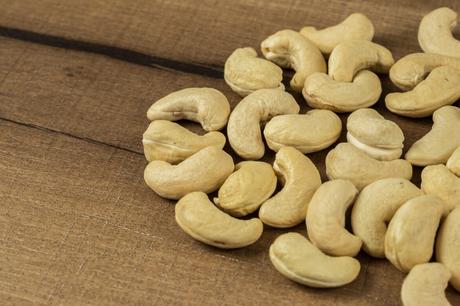
DESCRIPTION
- Scientific name – Anacardium occidentale
- Family – Anacardiaceae
- It has an evergreen shrub cultivated for its characteristically curved edible seeds.
- It is commonly called cashew “nuts”.
- They are eaten mainly as a premium-quality protein-rich snack.
Nutrients content
- Calories: 157
- Protein: 5 grams
- Fat: 12 grams
- Carbs: 9 grams
- Fiber: 1 gram
- Copper: 67%
- Magnesium: 20%
- Manganese: 20%
- Zinc: 15%
- Phosphorus: 13%
- Iron: 11%
- Selenium: 10%
- Thiamine: 10%
- Vitamin K: 8%
- Vitamin B6: 7%
- Cashews are rich inn unsaturated fats
- They are also low in sugar, a source of fiber, and contain almost the same amount of protein as in cooked meat.
- Cashews contain a significant amount of copper, a mineral that is essential for energy production, healthy brain development, and a strong immune system.
- Good source of magnesium and manganese, nutrients important for bone health.
Benefits
- Cashews help maintain a healthy heart –
- Cashews are full of monounsaturated fats, which are required to lower LDL cholesterol and raise HDL cholesterol.
- They help in lowering the blood pressure, prevent plaque formation and their accumulation in artery walls, and also help to lower triglyceride levels, which all work together to fight against heart disease, heart attack, and stroke.
- Cashews are important for blood health – Copper deficiency may lead to anemia, where a person’s red blood cell count is decreased.
- Cashews are rich in copper and some iron, which together help in the formation of red blood cells and utilization of red blood cells.
- Cashews can help manage weight – Research has shown that frequent consumption of nuts is associated with a reduced risk of weight gain.
- However, in moderation, they can actually help to manage weight because of the type of fat they contain, which is mostly monounsaturated fat.
- Cashews have healthy omega-3s, which help boost metabolism and burn fat.
- Eating nuts also leaves you feeling full longer, which can control cravings, overeating, or the urge to reach for an unhealthy snack.
- Cashews are good for the skin and hair –
- The copper present in cashew helps in the production of melanin, the pigment that gives skin, hair, and eyes color.
- Melanin production enhances the color of hairs, but it also acts as a natural sunscreen.
- It helps to block UV radiation from the sun that damaging the skin and potentially causing skin cancer.
- Cashews also contain antioxidants, which eliminate free radicals that build up in the body and cause cellular damage, which is responsible for the visible signs of aging.
- Cashews can help prevent gallstones – Studies show that eating nuts regularly can help to prevent painful gallstone formation because they work to lower bad cholesterol and lower triglycerides, both factors involve in gallstone formation.
- Cashews improve brain function – The brain needs a continuous supply of healthy fatty acids in order to properly function.
- The good fat we get from cashews, along with zinc, iron, copper, and manganese, helps support cognitive function and mood regulation and can reduce mental disorders such as ADHD, depression, and anxiety.
- Cashews are good for bone health – Vitamin K, copper, magnesium, and phosphorus are present in cashews all these are essential to build bones, maintain healthy bone density and support overall bone health.
- Copper helps to keep bones strong, making them less prone to breakage or osteoporosis. Magnesium is essential for healthy bone, build good bone structure, along with phosphorus.
- And vitamin K helps to balance calcium this is a key mineral in bone metabolism.
- Cashews are good for eye health – Cashews help protect the eyes from harmful UV rays come from the sun and free radical because they contain lutein and zeaxanthin which help to protect the eyes.
- These antioxidant pigments naturally present in the eyes and play an important role in damaging light and reduce the risks of developing age-related macular degeneration and cataracts.
- Cashews lower the risk for Type 2 diabetes – The monounsaturated fats present in cashews helps to lower the bad cholesterol and raise the good, and, the antioxidants found in cashews reduce inflammation, which causes insulin resistance and is the main cause of Type 2 diabetes.
- Cashews help prevent migraine headaches – The magnesium content found in cashews reduces the frequency and severity of migraine attacks because it relaxes blood vessels and reduces the pain.
- Cashews can help regulate thyroid function – Cashews contain the mineral selenium, which plays an important role in ensuring proper thyroid function, regulating thyroid levels, and protecting the thyroid’s tissue against oxidative stress.
- For women, this is especially important, as they are more prone to thyroid issues.
